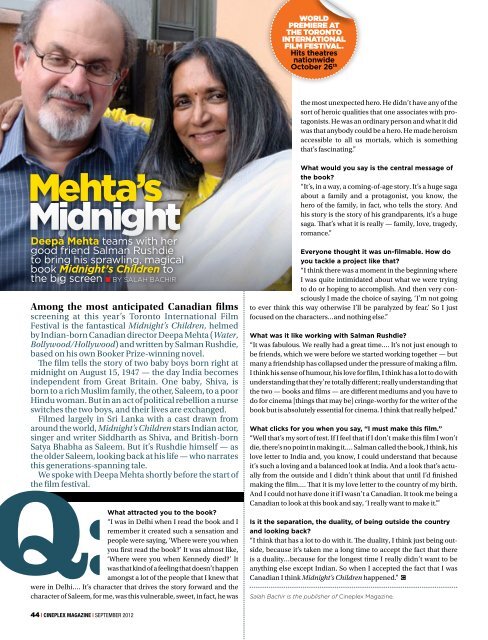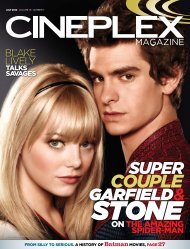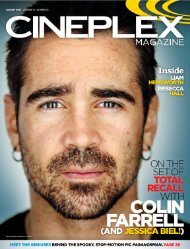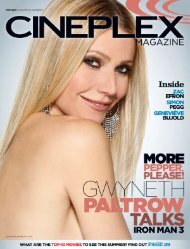Create successful ePaper yourself
Turn your PDF publications into a flip-book with our unique Google optimized e-Paper software.
Mehta’s<br />
Midnight<br />
Deepa Mehta teams with her<br />
good friend Salman Rushdie<br />
to bring his sprawling, magical<br />
book Midnight’s Children to<br />
the big screen n By Salah BaChir<br />
Among the most anticipated Canadian films<br />
screening at this year’s Toronto International Film<br />
Festival is the fantastical Midnight’s Children, helmed<br />
by Indian-born Canadian director Deepa Mehta (Water,<br />
Bollywood/Hollywood) and written by Salman Rushdie,<br />
based on his own Booker Prize-winning novel.<br />
The film tells the story of two baby boys born right at<br />
midnight on August 15, 1947 — the day India becomes<br />
independent from Great Britain. One baby, Shiva, is<br />
born to a rich Muslim family, the other, Saleem, to a poor<br />
Hindu woman. But in an act of political rebellion a nurse<br />
switches the two boys, and their lives are exchanged.<br />
Filmed largely in Sri Lanka with a cast drawn from<br />
around the world, Midnight’s Children stars Indian actor,<br />
singer and writer Siddharth as Shiva, and British-born<br />
Satya Bhabha as Saleem. But it’s Rushdie himself — as<br />
the older Saleem, looking back at his life — who narrates<br />
this generations-spanning tale.<br />
We spoke with Deepa Mehta shortly before the start of<br />
the film festival.<br />
What attracted you to the book?<br />
“I was in Delhi when I read the book and I<br />
remember it created such a sensation and<br />
people were saying, ‘Where were you when<br />
you first read the book?’ It was almost like,<br />
‘Where were you when Kennedy died?’ It<br />
was that kind of a feeling that doesn’t happen<br />
amongst a lot of the people that I knew that<br />
were in Delhi…. It’s character that drives the story forward and the<br />
character of Saleem, for me, was this vulnerable, sweet, in fact, he was<br />
44 | <strong>Cineplex</strong> <strong>Magazine</strong> | september <strong>2012</strong><br />
World<br />
Premiere At<br />
the toronto<br />
internAtionAl<br />
Film FestivAl.<br />
Hits theatres<br />
nationwide<br />
October 26 th<br />
the most unexpected hero. He didn’t have any of the<br />
sort of heroic qualities that one associates with protagonists.<br />
He was an ordinary person and what it did<br />
was that anybody could be a hero. He made heroism<br />
accessible to all us mortals, which is something<br />
that’s fascinating.”<br />
What would you say is the central message of<br />
the book?<br />
“It’s, in a way, a coming-of-age story. It’s a huge saga<br />
about a family and a protagonist, you know, the<br />
hero of the family, in fact, who tells the story. And<br />
his story is the story of his grandparents, it’s a huge<br />
saga. That’s what it is really — family, love, tragedy,<br />
romance.”<br />
Everyone thought it was un-filmable. How do<br />
you tackle a project like that?<br />
“I think there was a moment in the beginning where<br />
I was quite intimidated about what we were trying<br />
to do or hoping to accomplish. And then very consciously<br />
I made the choice of saying, ‘I’m not going<br />
to ever think this way otherwise I’ll be paralyzed by fear.’ So I just<br />
focused on the characters…and nothing else.”<br />
What was it like working with Salman Rushdie?<br />
“It was fabulous. We really had a great time…. It’s not just enough to<br />
be friends, which we were before we started working together — but<br />
many a friendship has collapsed under the pressure of making a film.<br />
I think his sense of humour, his love for film, I think has a lot to do with<br />
understanding that they’re totally different; really understanding that<br />
the two — books and films — are different mediums and you have to<br />
do for cinema [things that may be] cringe-worthy for the writer of the<br />
book but is absolutely essential for cinema. I think that really helped.”<br />
What clicks for you when you say, “I must make this film.”<br />
“Well that’s my sort of test. If I feel that if I don’t make this film I won’t<br />
die, there’s no point in making it…. Salman called the book, I think, his<br />
love letter to India and, you know, I could understand that because<br />
it’s such a loving and a balanced look at India. And a look that’s actually<br />
from the outside and I didn’t think about that until I’d finished<br />
making the film…. That it is my love letter to the country of my birth.<br />
And I could not have done it if I wasn’t a Canadian. It took me being a<br />
Canadian to look at this book and say, ‘I really want to make it.’”<br />
Is it the separation, the duality, of being outside the country<br />
and looking back?<br />
“I think that has a lot to do with it. The duality, I think just being outside,<br />
because it’s taken me a long time to accept the fact that there<br />
is a duality…because for the longest time I really didn’t want to be<br />
anything else except Indian. So when I accepted the fact that I was<br />
Canadian I think Midnight’s Children happened.”<br />
Salah Bachir is the publisher of <strong>Cineplex</strong> <strong>Magazine</strong>.
















